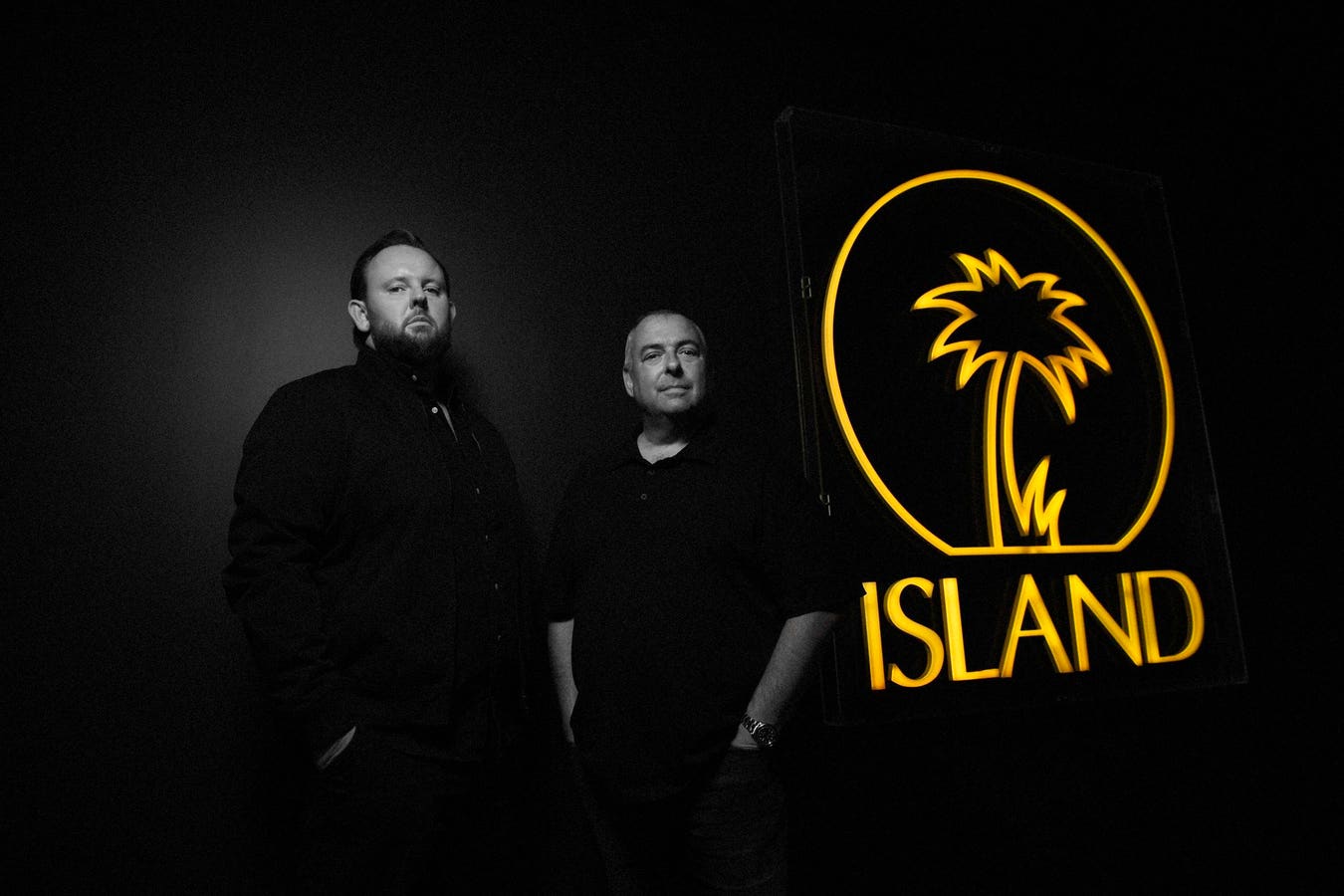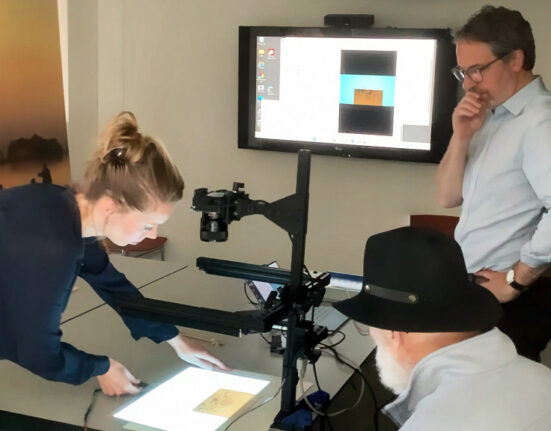“What’s been your key to success?” I ask.
“The music. It’s always been the key to success,” Kevin Harris says.
With a roster of talents such as Meduza, James Hype, Miggy—who is a featured artist on “Ferrari”—and HOLA!, it’s no wonder that Harris finds success with The Cross, for which he is the director and artist manager at Club Class Music Group.
The Cross, a label partnership with the UK’s Island Records and Germany’s Virgin Records, was founded in 2020. The imprint specializes in dance music but isn’t exclusive to that genre. The Cross also bolsters Island Records’ budding dance music roster, which includes Nia Archives, Bou and Joy Anonymous.
“We work very hard to try and create music that will stand the test of time and also will fit in trends to where the music industry and dance music is moving, but at the same time, always be real and true to the artist’s proposition,” Harris says.
In addition to acquiring acclaimed acts, The Cross prides itself on discovering emerging talent. Harris references recently signing an unknown artist to the imprint. The producer’s management company sent over his SoundCloud link, which only had three-quarters of an album on it. Upon listening, Harris found something that he says “inspired us musically.”
“It doesn’t matter that [the artist is] unknown,” he says. “I quite like the fact that nobody knows who they are. It gives us a blank page to create their vision of who they are because they come to us with a really clear vision of what they want to do. We are now going to try and facilitate that through their music.”
When looking for music to sign, Sergio Bienati—The Cross director and artist manager at Club Class Music Group—says they search for songs that the public will enjoy. He determines this by keeping up with current trends and being in tune with what people are already taking in, whether it’s something they already like or something that is the “polar opposite of what they’re listening to so that it stands out as a different thing.” He cites critically acclaimed trio Meduza as an example.
Meduza.
Jack Taylor Webster (Wild Wallace)
“When we signed Meduza, [it] was completely different to anything that was in the market at that particular time,” Bienati says. “That’s why I think that it got so big. It’s because while everyone was swimming left, this artist came out of nowhere and was swimming right.”
Meduza is a noteworthy illustration of how The Cross brought a project to success. Meduza was the Grammy-nominated breakout dance act of 2019. The trifecta’s debut release, “Piece Of Your Heart,” peaked at No. 2 on the Official UK Charts—just one of the impressive feats the multi-Diamond, Platinum and Gold certification holders claim.
James Hype is also worthy of mention. The producer boasts accredited sales awards in the UK and across Europe, and his singles have clocked up hundreds of millions of streams and almost half a billion cumulative streams worldwide. Harris says that dance music artists like these are successful when their music reaches multiple spaces.
“The songs that we have made, have continued to make and will continue to make for these artists have to be songs that balance between that fit [of] being able to be accessible globally across, I suppose, the radio commercially, but also, at the same time, [have] songs that can come out of the clubs and the dancefloor,” he says. “Because ultimately, we are working with electronic deejays here and artists here as well. I think there’s an important factor there in this genre that we want to make sure that the hits that are coming are also being played in the clubs.”
James Hype.
Tom Dieleman
As with any label that has signed an artist, working with them on more than just their music is essential. Where do they see themselves in the marketplace? How do they want to be perceived by the public? What kind of music do they want to make? Bienati says the imprint asks its talent these questions.
“It’s maintaining that presence, keeping their credibility and keeping the way that they view themselves in the marketplace in the right way because we are just a conduit for what they’re doing musically,” he says.
Harris says being part of the music industry’s evolution includes creating a content strategy focusing on how easily music gets digested. This conversation, he says, has mainly shifted towards TikTok, noting that it is “an important part of any promotional model now as much as radio, streaming and all the other elements that are needed for the success of any music.” He says all of these key factors simultaneously working together is necessary for a record to stand the test of time.
Regarding the gravitation towards TikTok, Bienati says that five years ago, people mainly consumed music on a Digital Service Provider (DSP), such as Spotify, Amazon Music, iTunes, Apple Music, Tidal and YouTube, which has accompanying videos. He says YouTube has dwindled the most, causing music videos to be a “potentially derailed format because kids are not that engaged to watch a music video and understand that there’s a conception behind it.” He says there is a decline in people’s attention span, resulting in the diminishing interest in long-form media. Nowadays, bite-sized content reigns supreme.
Harris says these changes—along with increased media coverage, how dance music is being performed in clubs and which deejays are playing the tunes—make for a landscape that calls for consistent adaptation. He says electronic music has evolved when compared to the scene in 2019 with Meduza’s aforementioned “Piece Of Your Heart” release.
“It was a moment in time,” he says. “I think that for electronic music, there’s a constantly moving target. There are hit records coming from, not just globally but nationally, different territories where a certain genre of electronic music is really pulling a strength. Whether that’s a faster BPM record to more music in the drops or more dance music within the record itself, rather than being full song-based records anymore, it’s constantly evolving.”
Bienati echoes Harris’ statement on the global increase in BPM this year, which makes music faster. He says radio records averaged 124 to 126 BPM three years ago, whereas now tracks are reaching 130 to 134 BPM. “It’s subtle, but it’s there,” he says.
Additionally, Bienati says this change is seen throughout the vast spectrum of electronic music genres. Still, he expects it to slow down due to the cyclicality of what’s hot in dance music. He has seen BPMs rise and decline during his 30 years in the scene, and he predicts that cadences will fall in two or three years.
As for The Cross’ future, Bienati says it will continue to be an outlet for dance music. Despite being connected to a major label, this specialty and history of coming from the dancefloor position The Cross to benefit from managers’ trusting it with their independent artists’ music. Big-name labels tend only to want commercial success. In contrast, The Cross looks for artist-driven projects with commercial success but, more importantly, will produce “cooler” music, even if it doesn’t gain mainstream appeal.
Harris adds that the future of The Cross includes continuing to grow its current roster, bringing on new artists, growing its streaming model, working with trends that dictate the future of dance music and continuing to push the genre forward.
“We want electronic music to be here and to stay forever,” Harris says. “We want to be part of that story.”






